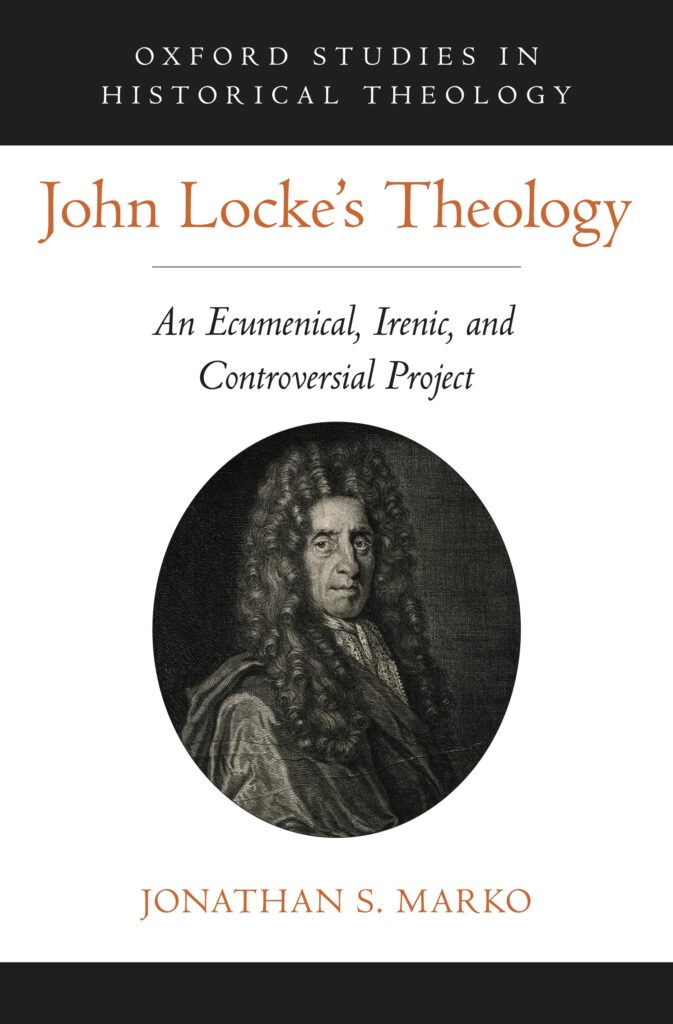In 1695, John Locke (1632-1704) published The Reasonableness of Christianity. Recently, Jonathan S. Marko has provided a much needed account of Locke’s treatise. He shares some thoughts about his new book.
What motivated you to write this book, and what is it about?
My book, John Locke’s Theology: An Ecumenical, Irenic, and Controversial Project (OUP, 2023), focuses on Locke’s theological program promulgated in his noted theological treatise, The Reasonableness of Christianity (ROC). In the book I argue that Locke’s primary intent for ROC was not to advance his own personal, theological opinions. Instead, he was hoping to give a version of the following issues that would be agreeable to all: a description of the fundamental doctrines of Christianity, a corresponding argument to identify true Christians, the necessity of Scripture, and the reasonableness of God using miracles to identify His revelation as such. Thus, Locke was attempting to create a common theological platform about which all Christian sects could agree. Furthermore, I show that Locke tries to avoid taking sides when treating hotly debated topics in An Essay Concerning Human Understanding and elsewhere.
Why is John Locke’s theology significant?
Locke’s theology is significant for several reasons. First, Locke significantly impacted 18th-century thought in a variety of fields. Knowing Locke, therefore, helps one to navigate that which came after him. Second, Locke was writing in an era rife with theological and philosophical debate, and I think he understood the theological debates far better than most commentators realize. He is deft in eluding definitive labels. So, reading Locke’s theology is not reading the theological reflections of a philosopher doing his best in an adjacent field, but rather reading the theology of a brilliant polymath. Third, Locke is an all-around systematic thinker. One cannot approach Locke as a compartmentalized mind. One cannot set aside his epistemology and theology to focus on his political thought or thoughts on education. His writings are largely mutually reinforcing. That is not to say, however, that we may approach any thinker, Locke included, assuming he or she is not developing or altering their thinking in various areas and on various topics over time.
Your book examines Locke’s The Reasonableness of Christianity (1695). What did he mean by ‘reasonableness’?
Locke did not believe that faith and reason were opposed. Few noted thinkers in the Enlightenment era did, contrary to popular narratives that abound in tertiary literature. He understood that religious faith was not truly such without the use of reason; otherwise, it was enthusiasm. This does not mean, however, that Locke thought that we could only believe that which we could discover on the power of reason unaided by special revelation, namely Scripture. Rather, Locke thought that while Scripture cannot overturn knowledge—and he did not think it attempted to do so—we should approach Scripture being prepared to have what we otherwise believe (as opposed to know) through our unaided natural reason or through human testimonies overturned. In other words, we should be prepared to change our beliefs to conform to Scripture.
That said, the reasonableness of Christianity of which Locke spoke is multifaceted. First, Christianity demands the use of reason. Locke thought that God gave us our reason and that we are responsible to use it thoroughly. The greater and farther reaching a decision is the more responsible we are to use our God-given reason. The grievousness of relying on authorities and so-called experts is directly proportional to the importance of the decision or action. Thus, it is forbidden for salvation. In fact, Locke thought that many Christian traditions in his time were instituting implicit faith, not unlike their Romish counterparts, with their use of extra-biblical confessions and catechisms in place of the words of Scripture.
The reasonableness of Christianity refers, second, to how reasonable our redemption is and, third, to how reasonable God’s use of divine revelation to communicate that and other things to us is. The redemption of Christianity is reasonable because of its simplicity (in addition to other wonderful attributes). The uneducated and poor could even glean the fundamental articles for themselves, or at least understand why one claims them to be such, through the hearing and discussion of the Bible. Along the same lines, revelation with corresponding miracles is the most reasonable type of conveyance because one does not have to be educated to know if something is naturally possible or not. And, even with a corresponding miracle, the revelation cannot be considered as such if it contains implicit or explicit contradictions.
In your book, you talk about the ecumenical and irenic approach of ROC. Can you tell us about this?
I have called ROC ecumenical and irenic for a few different reasons. Primarily, Locke, as noted above, was attempting to create a foundation upon which all Christians could build. He thought that if one is a monotheist, believes that Jesus is the Christ foretold in the Old Testament, and actively takes Jesus as King of his or her life, that person should be considered justified and a Christian. He is not saying that other doctrines are unimportant, but that these are by far the clearest points promulgated without doubt in Scripture. In fact, if one is convinced that Scripture promulgates the resurrection of the dead, but does not believe it, then that person is not taking Christ as King. A true servant should heed the words of His master and His Apostles. Locke wanted the church to focus upon the fundamentals that no person could miss—even the uneducated—to help the church to be more tolerant and less concerned with divisive theological debates. Given the climate in which Locke wrote, it is not surprising that his avoidance of discussing the Trinity and not expressly adopting penal substitutionary atonement in one form or another (i.e., traditional Protestant doctrines denied by some self-professed Christians) drew the intense attacks of some.
What would you say is the main contribution of your book?
There are a few primary contributions. For one, in the book I argue that ROC, except for certain pages, should be approached not as his personal opinions but as a theological program. That is, his main intent with ROC was to advance his program upon which all Christians might build. Also, the book demonstrates how deft he was at avoiding taking ‘sides’ in ROC and elsewhere. This in turn is evidence of how well he knew the philosophical and theological debates of the day to avoid being labeled.
Can we look forward to any other projects that you are working on?
I am bouncing back and forth between different projects. In one, I am focusing on those in the next generation after Locke, who would appropriately be called Lockeans. Locke’s impact is far-reaching and potent. I am also delving into Jonathan Edwards, concentrating particularly on his soteriology. What is more, I am working on a short work treating various thinkers regarding providence and free will. Time will tell which makes it out of the gate first.
Dr. Jonathan S. Marko is Associate Professor of Philosophical and Systematic Theology at Cornerstone University in Grand Rapids, Michigan. His primary areas of research are theological and philosophical thinkers, debates, and thought systems that arose in the 17th and 18th centuries.

